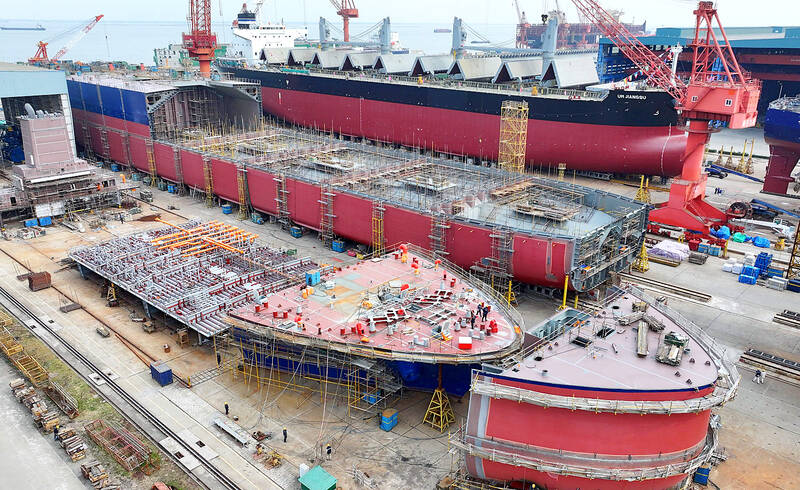The Office of the US Trade Representative on Thursday said that its probe into China’s practices in the shipbuilding, maritime and logistics sectors found that Beijing’s undermining of fair competition warranted “urgent action.”
The conclusion comes after the office launched an investigation last year, responding to a petition by five unions.
“Beijing’s targeted dominance of these sectors undermines fair, market-oriented competition, increases economic security risks and is the greatest barrier to revitalization of US industries,” US Trade Representative Katherine Tai (戴琪) said in a statement.

Photo: AFP
The findings, under Section 301 of the Trade Act, “set the stage for urgent action to invest in America and strengthen our supply chains,” Tai added.
The Chinese Ministry of Commerce hit back yesterday, saying it was “strongly dissatisfied and firmly opposes” the probe, and that its conclusions were “full of false accusations against China.”
A Section 301 investigation was a key tool US president-elect Donald Trump’s first administration used to justify tariff hikes on Chinese goods.
Tai on Thursday said that the US builds fewer than five ships each year — a sharp decline from in the 1970s — while China builds more than 1,700.
The investigation found China’s efforts to dominate the sector “unreasonable,” as they displace foreign firms and create dependencies on the world’s second-biggest economy.
The office said that Beijing also has “extraordinary control over its economic actors and these sectors.”
In its response, the Chinese ministry said that “historically, the decline of the US shipbuilding industry has had nothing to do with China.”
“China’s shipping market has always been open to the world and has never adopted discriminatory policies against foreign ships and foreign companies,” it said in a statement. “China’s industrial policy is mainly guiding rather than mandatory, and treats Chinese and foreign companies equally.”
“The US’ 301 investigation is based on domestic political needs and the aim to suppress China’s development,” the ministry said.
A decision on what actions to take would be considered in the next stage of the US probe.
Meanwhile, Alliance for American Manufacturing president Scott Paul on Thursday applauded the pursuit of the investigation.
“Failing to take decisive action will leave our shipbuilding capabilities at the mercy of Beijing’s persistent predatory market distortions,” Paul said.

Intel Corp chief executive officer Lip-Bu Tan (陳立武) is expected to meet with Taiwanese suppliers next month in conjunction with the opening of the Computex Taipei trade show, supply chain sources said on Monday. The visit, the first for Tan to Taiwan since assuming his new post last month, would be aimed at enhancing Intel’s ties with suppliers in Taiwan as he attempts to help turn around the struggling US chipmaker, the sources said. Tan is to hold a banquet to celebrate Intel’s 40-year presence in Taiwan before Computex opens on May 20 and invite dozens of Taiwanese suppliers to exchange views

Application-specific integrated circuit designer Faraday Technology Corp (智原) yesterday said that although revenue this quarter would decline 30 percent from last quarter, it retained its full-year forecast of revenue growth of 100 percent. The company attributed the quarterly drop to a slowdown in customers’ production of chips using Faraday’s advanced packaging technology. The company is still confident about its revenue growth this year, given its strong “design-win” — or the projects it won to help customers design their chips, Faraday president Steve Wang (王國雍) told an online earnings conference. “The design-win this year is better than we expected. We believe we will win

Chizuko Kimura has become the first female sushi chef in the world to win a Michelin star, fulfilling a promise she made to her dying husband to continue his legacy. The 54-year-old Japanese chef regained the Michelin star her late husband, Shunei Kimura, won three years ago for their Sushi Shunei restaurant in Paris. For Shunei Kimura, the star was a dream come true. However, the joy was short-lived. He died from cancer just three months later in June 2022. He was 65. The following year, the restaurant in the heart of Montmartre lost its star rating. Chizuko Kimura insisted that the new star is still down

While China’s leaders use their economic and political might to fight US President Donald Trump’s trade war “to the end,” its army of social media soldiers are embarking on a more humorous campaign online. Trump’s tariff blitz has seen Washington and Beijing impose eye-watering duties on imports from the other, fanning a standoff between the economic superpowers that has sparked global recession fears and sent markets into a tailspin. Trump says his policy is a response to years of being “ripped off” by other countries and aims to bring manufacturing to the US, forcing companies to employ US workers. However, China’s online warriors